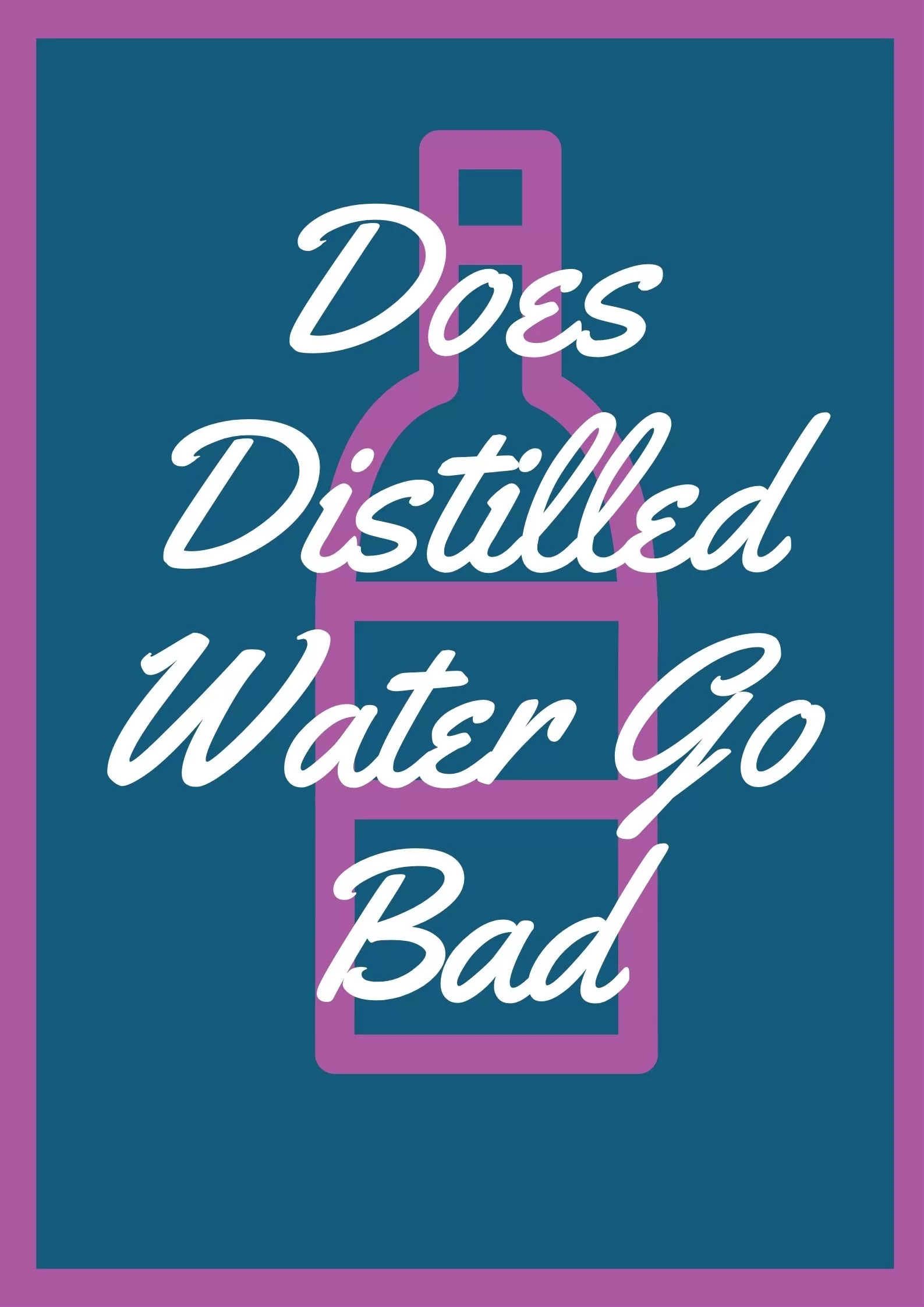Distilled water is a type of purified water and is the purest water we can drink. But does distilled water go bad? You will find out in this post.
WHAT IS DISTILLED WATER
Distilled water is produced by either removing ions or distillations. It is made from a plain water where both minerals and contaminants were removed. The boiling process dissolved minerals from the original water such that vapors are formed. Distilling water also removes all the impurities and draws out over 99.9 % minerals melted in the water, making it a clean drinking water.
DOES DISTILLED WATER GO BAD
All types of water do not go bad nor blemish. But due to air pollutants and the packaging process, distilled or purified water can be contaminated, making it unsafe to drink. As long as your distilled drinking water is stored properly, there is no way it will be spoiled.
How Does Distilled Water Tastes
Distilled drinking water taste flat or bland as the water only contains hydrogen and oxygen. This is because important minerals such as sodium, magnesium, and calcium have been removed after the distillation process.
Does Distilled Water Expire and What Is The Proper Way of Storing Distilled Water
If you are wondering how long does distilled water lasts, I would say ’till eternity. Yes, you read it right. When not exposed to contaminants and is stored properly, it can last forever. For commercial distilled water like the bottled water, manufacturers usually put the expiration date (best-before-date) on the plastic container. Storing distilled water in a proper way will surely extend its shelf life.
Storing it does not need high-tech equipment or complex method. You can store your unopened bottle or glass container of distilled water anywhere in your house as long as it is not exposed directly from the heat of the sun. You also need to make sure that the container is sealed tightly and is placed in a clean area. For best results, store distilled water in glass or HDPE containers.
For distilled water used as household cleaners or in your home appliances, it typically lasts up to 24 months. However, it is recommended to finish an open bottle of this water within 24 hours or up to 7 weeks for those stored in a larger glass or plastic container.
If you freeze distilled water with an opened bottle (refrigerated), its shelf life will last about 9-12 months, which is a bit longer compared to storing it in your pantry that will only last 3-7 days. Meanwhile, unopened bottles of distilled water shelf life if refrigerated will last more than 2 years. The unopened bottled water will also last more than 2 years when stored in your pantry.
HOW TO TELL IF DISTILLED WATER HAS GONE BAD
How can you tell if distilled water has gone bad? Simple. By looking at the water’s texture, you can right away determine if it has gone bad. But there are times that distilled water will still look good, but is no longer good for consumption. So here are the things you should take a look into to check if your stored distilled water has gone bad already:
- Green Algae. When the water is exposed to direct sunlight, it gives the contaminant the chance to get in. Thus, giving the higher chance for the green algae to emerge. So, never drink distilled water with blue-green floating sediments as it has already been contaminated.
- Fogginess. If the texture of the distilled water becomes cloudy, it indicates the presence of pathogens or contaminants. It is perfectly fine if the distilled water will be used for your home appliances, steam iron, or for watering plants, but if it is a drinking distilled water, it’s time to discard it as it is no longer good for consumption.
- Stinky smell. A distilled water with an off smell is also a sign that it has been contaminated. Sometimes, it is hard to find out if the water has already gone bad by smelling it from the plastic containers. For a more accurate conclusion, pour enough distilled water in a glass and check its smell. If it smells stinky, it is no longer safe to drink. You must discard the opened bottled distilled water and go with a fresh batch.
- Distinct Taste. Distilled water that becomes smelly also has a bad taste. As previously mentioned, distilled water tastes bland compared to plain water as the minerals had been stripped away after the “distilling water ” or the rigorous purification process. You’ll know then if something is going bad if the water already has a chemical taste.
How To Store Distilled Water
To extend your distilled water shelf life, it is critical to know how to properly store them. Here are the basic storage guidelines you should remember when storing your distilled water:
- Use the appropriate storage container. To preserve the quality of your distilled water, it is important to use the proper storage. For distilled water with larger quantities, use a high density polyethylene container or tanks. These kinds of tanks are impact resistant and are not prone to rust which can protect the distilled water from light exposure, keeping it clean and cool. See to it as well that the containers have food-grade quality to extend its shelf life without being contaminated. If you are storing distilled water in a few ounces, it is ideal to store them in glass bottles. Plastic bottles have the tendency to release chemicals into the water, and disintegrate.
- Keep your container tightly sealed. Distilled water for drinking should be sealed tightly to keep chemical contaminants away. Glass tank or container sealed tightly has fewer chances of getting contaminated.
- Do not expose to sunlight. Direct exposure to sunlight can affect the water’s purity, especially those store bought distilled water placed in plastic containers. There’s a great chance that the plastic will disintegrate, causing the chemicals to leak into the water. Thus, you should store distilled water in a relatively cool temperature or a dark place. During warmer days, avoid drinking directly from the bottle as there’s a higher chance for the natural mouth bacteria to enter the bottle.
- Keep away from odorous substances. One characteristic that distilled water has with normal water and normal mineral water is its ability to pick up smells in the surroundings. Though it does not directly affect the water’s purity, keeping the water odorless is still a thing to consider, especially if it’s for drinking purposes. To keep your distilled water tastes and smells fresh, keep it away from materials with strong odors like the paint or dry cleaning chemicals.
- Store opened bottled distilled water in a refrigerator. Distilled water for drinking purposes must be stored in a refrigerator to prevent it from being contaminated with toxic substances. The cooling systems definitely affect your distilled water’s shelf life as well as its purity. As long as the water is not for your home or garage appliances, following this specific storage guideline is very critical. Again, opened bottled water absorbs toxic substances like carbon dioxide faster than the unopened distilled water.
Can distilled water absorb carbon dioxide in an unopened bottle? Probably not. Microbial contamination and the chance of absorbing chemical materials is quite lower compared to open bottled water.
If you plan to freeze distilled water, it is possible. Freezing the water will not affect the water’s purity. In fact, it is another way of storing your distilled water. Distilled water leaches minerals from the metal container, so freezing it is also a good idea of storing the water. When frozen, there is no chance that the water absorbs carbon dioxide and other toxic materials.
What are the risks of consuming contaminated distilled water?
Drinking contaminated distilled water can cause serious health effects. Skin discoloration and nervous system problems are among the side effects of consuming distilled water with high amounts of chemical contaminants. While consumer lower doses of contaminant chemicals can cause high risk of cancer, especially when consumed in a long period of time.
Distilled waters that have been contaminated with pathogens can cause fever, headache, diarrhoea, stomach pain, and up to kidney failure. If your distilled drinking water shows any signs of contamination, do not attempt to taste nor consume the water. If you ran out of store bought distilled water, you can have your own distilled water from your faucet using a steam distiller.

